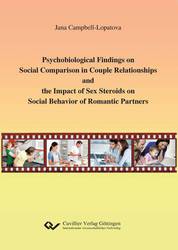| Fachbereiche | |
|---|---|
| Buchreihen (97) |
1381
|
| Nachhaltigkeit |
3
|
| Gesundheitswesen |
1
|
| Geisteswissenschaften |
2370
|
| Medienwissenschaften | 16 |
| Theologie | 57 |
| Philosophie | 102 |
| Rechtswissenschaft | 423 |
| Wirtschaftswissenschaften | 852 |
| Sozialwissenschaften | 417 |
| Sportwissenschaften | 48 |
| Psychologie | 233 |
| Pädagogik | 190 |
| Geschichtswissenschaften | 183 |
| Kunstwissenschaften | 111 |
| Kulturwissenschaften | 166 |
| Literaturwissenschaften | 117 |
| Sprachwissenschaften | 88 |
| Naturwissenschaften |
5407
|
| Ingenieurwissenschaften |
1798
|
| Allgemein |
98
|
|
Leitlinien Unfallchirurgie
5. Auflage bestellen |
|
Erweiterte Suche
Psychobiological Findings on Social Comparison in Couple Relationships and the Impact of Sex Steroids on Social Behavior of Romantic Partners
Jana Campbell-Lopatova (Autor)Vorschau
Leseprobe, PDF (73 KB)
Inhaltsverzeichnis, PDF (54 KB)
Social comparison (SC) processes between romantic partners have been shown to occur each and every day. In this thesis, an experimental design was applied, which induced SC in couples by a systematic variation of performance feedback in a manipulated pretend IQ test. Sixty-two healthy heterosexual couples were randomly assigned to four experimental groups, in which either men (N=16 couples), or women (N=16 couples) were provided with a superior performance feedback and compared to couples, who received equal feedback (N=15 couples) or no feedback (N=15 couples). The immediate affective as well as physiological responses of partners to SC were assessed using repeated measures of mood and the level of the gonadal hormones Testosterone (T) and Estradiol (E2) and the stress hormone Cortisol ©. Our results revealed that women were subjectively as well as physiologically more affected by SC, indicated by significant changes in mood and the level of the gonadal hormones T and E2. In a second study, couples engaged in a decision making task, which was coded for the assessment of interpersonal behavior on the dimensions of dominance and affiliation. Salivary T and E2 were assessed prior to the interaction and were tested for their predictive value of females’ and males’ expressed social behavior towards their partners. Estradiol levels in women were positively associated with the total amount of friendly behavior.
| ISBN-13 (Printausgabe) | 9783954045297 |
| ISBN-13 (E-Book) | 9783736945296 |
| Buchendformat | A5 |
| Sprache | Englisch |
| Seitenanzahl | 168 |
| Umschlagkaschierung | glänzend |
| Auflage | 1 Aufl. |
| Erscheinungsort | Göttingen |
| Promotionsort | Zürich |
| Erscheinungsdatum | 16.12.2013 |
| Allgemeine Einordnung | Dissertation |
| Fachbereiche |
Psychologie
|
| Schlagwörter | Social comparison, evaluative feedback, couples, sex differences, social behavior, dominance, affiliation, interpersonal circumplex, gonadal hormones, testosterone, estradiol |








